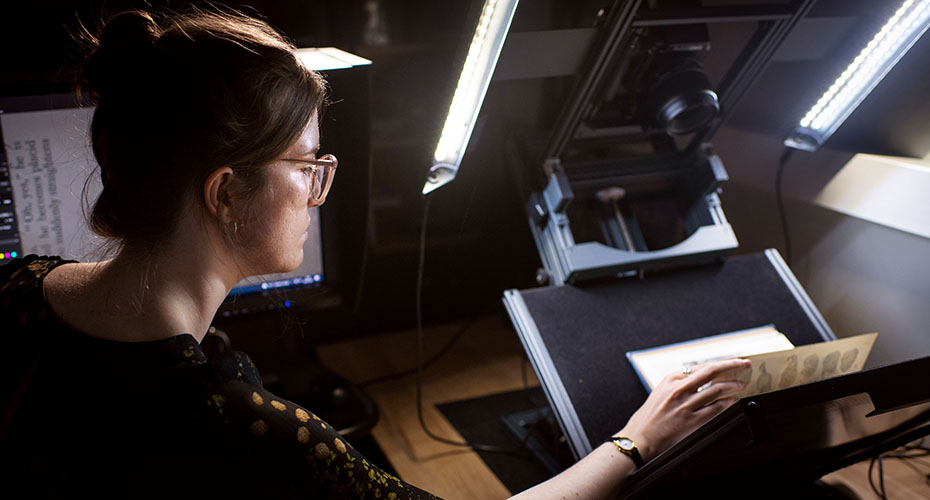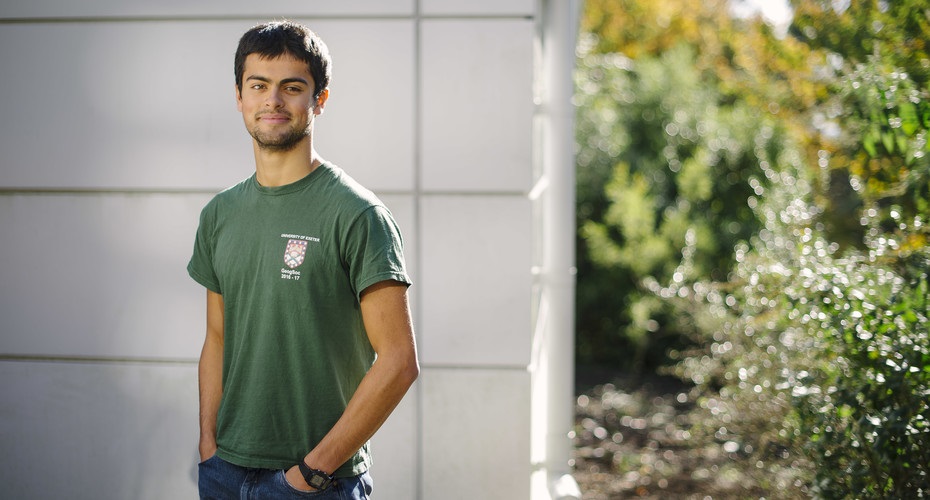| Degrees |
|
|---|---|
| Duration |
| Start date | September, January or April |
|---|---|
| Locations | Streatham Campus
Penryn Campus |
| Study modes | Full time and part time |
Overview
- A lively and dynamic group that boasts some of the leading academic historians in the country
- Our staff provide postgraduates with a considerable breadth of experience and research expertise across the full range of the discipline
- Among the upper ranks of History departments in the UK
- All members of staff are research active and research and publish at the highest level
- We range in time from the early medieval period to the late 20th century with particular strengths in the history of Britain and continental Europe, but also focus on the history of the United States, Africa, and India
Contact
Web: Enquire online
Phone: 0300 555 6060 (UK)
+44 (0)1392 723044 (non-UK)
![]()
Approximately 50 staff over two campuses
![]()
We are 6th in the UK for research in History
Based on our GPA in REF 2021
![]()
Top 100 in world subject rankings for History
QS World University Subject Rankings 2023
![]()
Top 10 in UK subject rankings for History
10th in the Complete University Guide 2024
Research overview
History is located across two campuses, with our Penryn Campus in Cornwall focusing on public history and the environment and our Streatham Campus in Exeter covering medieval history, early modern socio-economic history, maritime history, modern British politics and policy, global and medical histories.
Collaboration in and across research centres, and with other disciplines, enables our historians to increase the scale and scope of their research activity through collaboration, critical review, and scholarly dissemination.
Research centres
Seeks to promote a greater knowledge of historical and contemporary Cornwall. A partnership between the University and Cornwall Council, it combines academic research and teaching with community engagement.
Focuses intellectual exchanges and interdisciplinary activity. Engaged in research on all aspects of the period between c1500 and 1800, expertise spreads from Britain and Europe to the Middle East and North America.
Provides a forum for staff and postgraduates in a number of disciplines linked by their shared interest in the impact of war, civil conflict, and political violence on societies and communities.
Brings together the strong research expertise of the University's eminent imperial historians. It comprises of one of the largest groups of imperial and global historians currently working in the UK.
Utilises a wide range of expertise in maritime historical studies and seeks to promote research into various aspects of the British maritime past from the earliest times to the present day.
Advancing methods and areas of research within the history of medicine, and linking with medical and health care professionals in the region.
The Centre provides the focal point for interdisciplinary scholarship and learning in a wide variety of subjects relating to the Middle Ages.
The Exeter South Asia Centre brings together an interdisciplinary group of researchers and postgraduate students across the College whose work relates wholly or in part to the wider Indian subcontinent and global South Asian communities with their associated diasporas.
How to apply
Students applying to enter directly into the MPhil/PhD programme would normally be expected to have a Masters degree with Merit or equivalent in History or a related subject, or other relevant qualifications such as a doctorate in another subject.
Students applying to enter into the MA by Research will require a minimum 2.1 Honours degree in History or a related degree, with a minimum 2.1 grade in the undergraduate dissertation. Students with degrees in related subjects will be considered on an individual basis.
Requirements for international students
If you are an international student, please visit our international equivalency pages to enable you to see if your existing academic qualifications meet our entry requirements.
English language requirements
International students need to show they have the required level of English language to study this course. The required test scores for this course fall under Profile E: view the required test scores and equivalencies from your country.
PhD and Research Programme application process
The information below applies to self-funded PhD, MPhil and Masters by Research applicants, but if you are applying for a funded PhD studentship, please follow the specific instructions related to that application.
- Pinpoint your PhD research area
- Investigate whether this area is available at Exeter
- Ensure that you meet our English language entry requirements (international students only)
- Construct and refine your PhD research proposal
- Approach your potential supervisor(s)
- Apply online
PhD studentships pages can be accessed in our Funding lists on Finance tabs under each research topic page, and are also available from the Postgraduate Research search results pages on this site, on the PhD projects tab.
Full details of the application process can be found on our Apply now webpage.
Fees and funding
Tuition fees per year 2024/25
- Home: £4,786 full-time; £pro-rata part-time
- International: £22,600 full-time
For those studying for more than one year, our fees are expected to increase modestly in line with Consumer Price Inflation measured in December each year. More information can be found on our Student Finance webpages.
Tuition fees per year 2023/24
- Home: £4,712 full-time; £pro-rata part-time
- International: £20,500 full-time
For those studying for more than one year, our fees are expected to increase modestly in line with Consumer Price Inflation measured in December each year. More information can be found on our Student Finance webpages.
Our Postgraduate Funding webpage provides links to further information. If you are considering a PhD in the future, in addition to University of Exeter funding, we have been successful at securing postgraduate funding for PhD research through our Funded centres.
Current available funding
Supervision
Supervisors - all students have a primary and a secondary supervisor who provide regular, high quality advice, support and direction in their academic endeavours. You will work closely with your supervisors over three to four years (full time PhD) or six to seven (part-time PhD) to develop, investigate and write-up a project at the cutting edge of theological research.
Mentor - each student will also be assigned a mentor who will take on a pastoral role and mediate on any problems that arise during the period of study. Your mentor will keep in regular contact and will provide background stability and support.
Facilities

The College of Humanities has undergone a £3.2 million HEFCE-funded refurbishment in recent years, providing new state-of-the-art facilities for all subjects.
The Digital Humanities Lab is a state of the art facility offering unique spaces, equipment and training for staff and students. A specialist team conducts and supports innovative Digital Humanities research, offers training and teaching, and undertakes the digital preservation and display of historic material and artefacts using advanced technologies.
The University library maintains extensive holdings in all our disciplines, extensive audio-visual collections and a number of medieval manuscripts in our Heritage Collections while Exeter Cathedral Library and Archives and the Devon Heritage Centre contain further significant medieval manuscripts, documents and early printed books. Thanks to the help of a substantial grant from the Leverhulme Trust, The Exeter Local Maritime Archives Project (ELMAP) has created a searchable online database of references to records with maritime and naval significance that are held in local record offices and other archives across England and Wales.
The Queen’s Building (Streatham Campus) and the Peter Lanyon Building (Penryn Campus) offer dedicated postgraduate common rooms with computer facilities and a number of study carrels available for research students.
Students at both campuses have access to a wealth of online information including: over 400 online journal titles; the extensive Gale Eighteenth Century Collections Online (ECCO) research archive; search tools such as FirstSearch; the digital archive JSTOR; and other similar databases providing access to full text articles.
Careers
We are committed to ensuring you receive high quality research supervision to maximise your potential and prepare you for a rewarding career.
Our postgraduates go on to successful careers, both within and beyond academia. Recent graduates have won major ESRC and UKRI Future Leader research grants, Leverhulme and international postdoctoral awards, and gone straight into permanent lectureships. Others have applied skills gained through their PhDs to move into careers in education, business, marketing, publishing and other fields.
Postgraduate students have access to the wide range of support offered by our Career Zone. In addition, postgraduate research students can access our Postgraduate Researchers' Programme, which covers a range of topics to help you to succeed during your research degree and to act as a springboard for your research career.
Graduate destinations
Below are some examples of initial jobs undertaken by History postgraduates who studied with us in recent years.
Please note that, due to data protection, the job titles and organisations are listed independently and do not necessarily correspond.
| Job titles | Organisations |
|---|---|
| Historian Researcher Lecturer Curriculum Area Manager Senior consultant developer Producer Teacher Research and Development Officer Historian writer |
Boydell and Brewer
|











